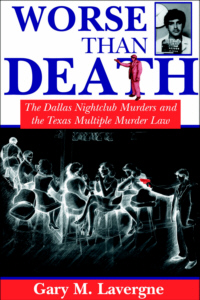|
About Gary Lavergne
News
Articles
BEFORE BROWN
A SNIPER IN THE TOWER
BAD BOY FROM ROSEBUD
WORSE THAN DEATH
•
Reviews
•
Excerpt
•
2003 TX Bk Fest
Cajuns |

In
1984, a Moroccan national named Abdelkrim Belachheb, walked into a Dallas
nightclub and gunned down seven people. Six died.
Despite the fact that the
crimes occurred in a state that prides itself on being tough on criminals and
quick to use lethal injection, the death penalty was not an option for the
Belachheb jury. Even though he had committed six murders, and his guilt was
never in question, his crimes were not capital murders under the statutes of
that day.
 Part of the epiphany that followed included the realization that
terrorist acts such as mass murder did not automatically fall under the capital murder umbrella.
Curiously, had Belachheb killed only one person and taken the time to steal a
dime from a purse or an ashtray off of a table prosecutors could have gone for
the death penalty.
Part of the epiphany that followed included the realization that
terrorist acts such as mass murder did not automatically fall under the capital murder umbrella.
Curiously, had Belachheb killed only one person and taken the time to steal a
dime from a purse or an ashtray off of a table prosecutors could have gone for
the death penalty.
As a direct result of the Belachheb murders,
during the 1985 regular session, the Texas Legislature passed House Bill 8—the
“multiple murder” statute. The Act made serial killing and mass murder
capital crimes.
Today, Abdelkrim Belachheb is serving six life sentences in a Texas prison under the
highest security for what he did on June 29, 1984. Pro-death penalty advocates
argue that he escaped justice through a loophole in Texas law that was closed by
the legislature less than a year after his mass murder. Others argue that he
illustrates why we do not need capital punishment--for his is a fate Worse
Than Death.
|
See an interview with Gary Lavergne about his book WORSE THAN DEATH...
"Gary Lavergne has
turned his impeccable journalistic talents to a Texas multiple murder that has
been mostly forgotten during the intervening years of mass killings and acts
of terror. But Lavergne vividly recreates the crime and its aftermath and
brings the reader inside the vortex of a horrendous and senseless crime.
Through his meticulous and dispassionate presentation, he reveals what it was
like to stand in the shoes of the victims, their families, the police, and the
prosecutors, and finally, even the murderer. Lavergne's answer to what is
"worse than death" is an important and timely addition to the
American debate over the death penalty."
-Gerald Posner, Author, Why
America Slept
"This is a superbly written book about an extraordinary case whose significance ranged from influencing
death penalty legislation to directly foreshadowing the types of security lapses that led to September 11th. It is among the best I have
read in its genre, presenting details and nuances from every perspective--perpetrator, victims, investigators and prosecutors--but
always with deep regard for the humanity behind the case. We understand everyone, which makes this account of the tragic, random
intersection of lives at the vortex of a crime all the more perceptive."
-Bob Brown, Correspondent, ABC News 20/20
In his newest true-crime book,
Gary Lavergne expertly and vividly revisits a largely forgotten multiple murder at a night club in Dallas,
Texas in the 1980s, and shows us why we must not shrink from the face of evil and why, imperfect
as it is, the criminal justice system must strive nonetheless to achieve justice. This is also a powerful indictment of the INS's
porous policies regarding admitting dangerous criminals into the U.S.--seventeen years before 9-ll.
-Don Graham, Author, Kings of
Texas
"As mass murders go,
Abdelkrim Belachheb's shooting spree in a Dallas nightclub eighteen years ago
was on the modest side, if only because his gun jammed. The six people he shot
off their barstools wasn't even the highest body count that summer, when
twenty-one people were gunned down in a McDonald's outside San Diego. Yet if
American authorities had responded to the lessons of the Dallas murders, Sept.
11th might have been just another day.
Belachheb wasn't a terrorist, but a Moroccan national with a long criminal
record who was wanted for violent crimes in Europe but was nonetheless issued a
U.S. visa, based on nothing more than the information he himself supplied. Sound
familiar?
Gary Lavergne connects the dots in a way one only wishes the I.N.S. had, in this
vivid and highly relevant account of a case that led not to increased national
security but to tougher Texas laws on how the death penalty is administered. His
portrait of a killer he calls 'a poster boy, not for capital punishment,
but for life in prison' is unforgettable."
-Melinda
Henneberger, former investigative reporter for the Dallas
Morning News and the New York Times.
| Gary's Bio
|Before Brown| Worse
Than Death| Bad Boy From Rosebud |
Sniper in the Tower | Cajuns
|
 |


 Part of the epiphany that followed included the realization that
terrorist acts such as mass murder did not automatically fall under the capital murder umbrella.
Curiously, had Belachheb killed only one person and taken the time to steal a
dime from a purse or an ashtray off of a table prosecutors could have gone for
the death penalty.
Part of the epiphany that followed included the realization that
terrorist acts such as mass murder did not automatically fall under the capital murder umbrella.
Curiously, had Belachheb killed only one person and taken the time to steal a
dime from a purse or an ashtray off of a table prosecutors could have gone for
the death penalty.
.gif)